Sport

A Sport is a form of
Sport is generally recognised as system of activities based in physical
Records of performance are often kept, and for popular sports, this information may be widely announced or reported in
According to A.T. Kearney, a consultancy, the global sporting industry is worth up to $620 billion as of 2013.[6] The world's most accessible and practised sport is running, while association football is the most popular spectator sport.[7]
Meaning and usage
Etymology
The word "sport" comes from the Old French desport meaning "leisure", with the oldest definition in English from around 1300 being "anything humans find amusing or entertaining".[8]
Other meanings include gambling and events staged for the purpose of gambling; hunting; and games and diversions, including ones that require exercise.[9] Roget's defines the noun sport as an "activity engaged in for relaxation and amusement" with synonyms including diversion and recreation.[10]
Nomenclature
The singular term "sport" is used in most English dialects to describe the overall concept (e.g. "children taking part in sport"), with "sports" used to describe multiple activities (e.g. "football and rugby are the most popular sports in England"). American English uses "sports" for both terms.[citation needed]
Definition
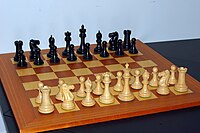
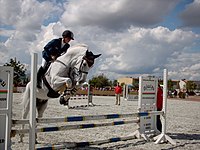
The precise definition of what differentiates a sport from other leisure activities varies between sources. The closest to an international agreement on a definition is provided by the
, and more), and is therefore the de facto representative of international sport.GAISF uses the following criteria, determining that a sport should:[1]
- have an element of competition
- be in no way harmful to any living creature
- not rely on equipment provided by a single supplier (excluding proprietary games such as arena football)
- not rely on any "luck" element specifically designed into the sport.
They also recognise that sport can be primarily physical (such as
The inclusion of mind sports within sport definitions has not been universally accepted, leading to legal challenges from governing bodies in regards to being denied funding available to sports.[11] Whilst GAISF recognises a small number of mind sports, it is not open to admitting any further mind sports.
There has been an increase in the application of the term "sport" to a wider set of non-physical challenges such as video games, also called esports (from "electronic sports"), especially due to the large scale of participation and organised competition, but these are not widely recognised by mainstream sports organisations. According to Council of Europe, European Sports Charter, article 2.i, "'Sport' means all forms of physical activity which, through casual or organised participation, aim at expressing or improving physical fitness and mental well-being, forming social relationships or obtaining results in competition at all levels."[12]
Competition
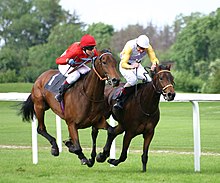
There are opposing views on the necessity of competition as a defining element of a sport, with almost all professional sports involving competition, and governing bodies requiring competition as a prerequisite of recognition by the International Olympic Committee (IOC) or GAISF.[1]
Other bodies advocate widening the definition of sport to include all physical activity. For instance, the Council of Europe include all forms of physical exercise, including those competed just for fun.[citation needed]
In order to widen participation, and reduce the impact of losing on less able participants, there has been an introduction of non-competitive physical activity to traditionally competitive events such as school sports days, although moves like this are often controversial.[13][14]
In competitive events, participants are graded or classified based on their "result" and often divided into groups of comparable performance, (e.g. gender, weight and age). The measurement of the result may be objective or subjective, and corrected with "handicaps" or penalties. In a race, for example, the time to complete the course is an objective measurement. In gymnastics or diving the result is decided by a panel of judges, and therefore subjective. There are many shades of judging between boxing and mixed martial arts, where victory is assigned by judges if neither competitor has lost at the end of the match time.[citation needed]
History

Artifacts and structures suggest

A wide range of sports were already established by the time of Ancient Greece and the military culture and the development of sport in Greece influenced one another considerably. Sport became such a prominent part of their culture that the Greeks created the Olympic Games, which in ancient times were held every four years in a small village in the Peloponnesus called Olympia.[19]
Sports have been increasingly organised and regulated from the time of the ancient Olympics up to the present century. Industrialisation has brought motorised transportation and increased
Fair play
Sportsmanship
Sportsmanship is an attitude that strives for fair play, courtesy toward teammates and opponents, ethical behaviour and integrity, and grace in victory or defeat.[21][22][23]
Sportsmanship expresses an aspiration or ethos that the activity will be enjoyed for its own sake. The well-known sentiment by sports journalist Grantland Rice, that it is "not that you won or lost but how you played the game", and the modern Olympic creed expressed by its founder Pierre de Coubertin: "The most important thing... is not winning but taking part" are typical expressions of this sentiment.[citation needed]
Cheating
Key principles of sport include that the result should not be predetermined, and that both sides should have equal opportunity to win. Rules are in place to ensure fair play, but participants can break these rules in order to gain advantage.
Participants may cheat in order to unfairly increase their chance of winning, or in order to achieve other advantages such as financial gains. The widespread existence of gambling on the results of sports events creates a motivation for match fixing, where a participant or participants deliberately work to ensure a given outcome rather than simply playing to win.
Doping and drugs
The competitive nature of sport encourages some participants to attempt to enhance their performance through the use of medicines, or through other means such as increasing the volume of blood in their bodies through artificial means.
All sports recognised by the IOC or SportAccord are required to implement a testing programme, looking for a list of banned drugs, with suspensions or bans being placed on participants who test positive for banned substances.[citation needed]
Violence
Participation
Gender participation

Female participation in sports continues to rise alongside the opportunity for involvement and the value of sports for child development and physical fitness. Despite increases in female participation during the last three decades, a gap persists in the enrolment figures between male and female players in sports-related teams. Female players account for 39% of the total participation in US interscholastic athletics.[citation needed]
Certain sports are
Youth participation
Youth sport presents children with opportunities for fun, socialisation, forming peer relationships,
Disabled participation
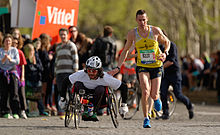
Disabled or adaptive sports are played by people with a
Spectator involvement

The competition element of sport, along with the aesthetic appeal of some sports, result in the popularity of people attending to watch sport being played. This has led to the specific phenomenon of spectator sport.
Both amateur and professional sports attract spectators, both in person at the sport venue, and through broadcast media including radio, television and internet broadcast. Both attendance in person and viewing remotely can incur a sometimes substantial charge, such as an entrance ticket, or pay-per-view television broadcast. Sports league and tournament are two common arrangements to organise sport teams or individual athletes into competing against each other continuously or periodically.[citation needed]
It is common for popular sports to attract large broadcast audiences, leading to rival broadcasters bidding large amounts of money for the rights to show certain events. The football
In the United States, the championship game of the NFL, the Super Bowl, has become one of the most watched television broadcasts of the year.[28][29]
Super Bowl Sunday is a de facto national holiday in America;
Amateur and professional

Sport can be undertaken on an amateur, professional or semi-professional basis, depending on whether participants are incentivised for participation (usually through payment of a wage or salary). Amateur participation in sport at lower levels is often called "grassroots sport".[2][32]
The popularity of
Some sports, or individual competitions within a sport, retain a policy of allowing only
Technology

Technology plays an important part in modern sport. It is a necessary part of some sports (such as motorsport), and it is used in others to improve performance. Some sports also use it to allow off-field decision making.
The increase in technology has also allowed many decisions in sports matches to be taken, or reviewed, off-field, with another official using instant replays to make decisions. In some sports, players can now challenge decisions made by officials. In
Sports and education
Research suggests that sports have the capacity to connect youth to positive adult role models and provide positive development opportunities, as well as promote the learning and application of life skills.[60][61] In recent years the use of sport to reduce crime, as well as to prevent violent extremism and radicalization, has become more widespread, especially as a tool to improve self-esteem, enhance social bonds and provide participants with a feeling of purpose.[61]
There is no high-quality evidence that shows the effectiveness of interventions to increase sports participation of the community in sports such as mass media campaigns, educational sessions, and policy changes.[62] There is also no high-quality studies that investigate the effect of such interventions in promoting healthy behaviour change in the community.[63] sports is one of the important part of life
Politics
When apartheid was the official policy in South Africa, many sports people, particularly in rugby union, adopted the conscientious approach that they should not appear in competitive sports there. Some feel this was an effective contribution to the eventual demolition of the policy of apartheid, others feel that it may have prolonged and reinforced its worst effects.[68]
In the history of Ireland, Gaelic sports were connected with cultural nationalism. Until the mid-20th century a person could have been banned from playing Gaelic football, hurling, or other sports administered by the Gaelic Athletic Association (GAA) if she/he played or supported Association football, or other games seen to be of British origin. Until recently the GAA continued to ban the playing of football and rugby union at Gaelic venues. This ban, also known as Rule 42,[69] is still enforced, but was modified to allow football and rugby to be played in Croke Park while Lansdowne Road was redeveloped into Aviva Stadium. Until recently, under Rule 21, the GAA also banned members of the British security forces and members of the RUC from playing Gaelic games, but the advent of the Good Friday Agreement in 1998 led to the eventual removal of the ban.[70]
Nationalism is often evident in the pursuit of sport, or in its reporting: people compete in national teams, or commentators and audiences can adopt a partisan view. On occasion, such tensions can lead to violent confrontation among players or spectators within and beyond the sporting venue, as in the Football War. These trends are seen by many as contrary to the fundamental ethos of sport being carried on for its own sake and for the enjoyment of its participants. Sport and politics collided in the 1972 Olympics in Munich. Masked men entered the hotel of the Israeli Olympic team and killed many of their men. This was known as the Munich massacre.[citation needed]
A study of US elections has shown that the result of sports events can affect the results. A study published in the
As a means of controlling and subduing populations
Étienne de La Boétie, in his essay Discourse on Voluntary Servitude describes athletic spectacles as means for tyrants to control their subjects by distracting them.
Do not imagine that there is any bird more easily caught by decoy, nor any fish sooner fixed on the hook by wormy bait, than are all these poor fools neatly tricked into servitude by the slightest feather passed, so to speak, before their mouths. Truly it is a marvellous thing that they let themselves be caught so quickly at the slightest tickling of their fancy. Plays, farces, spectacles, gladiators, strange beasts, medals, pictures, and other such opiates, these were for ancient peoples the bait toward slavery, the price of their liberty, the instruments of tyranny. By these practices and enticements the ancient dictators so successfully lulled their subjects under the yoke, that the stupefied peoples, fascinated by the pastimes and vain pleasures flashed before their eyes, learned subservience as naïvely, but not so creditably, as little children learn to read by looking at bright picture books.[74]
During the British rule of Bengal, British and European sports began to supplant traditional Bengali sports, resulting in a loss of native culture.[75][76]
Religious views
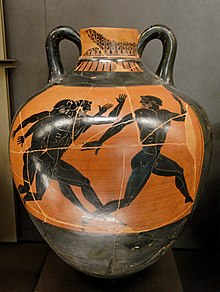
Sport was an important form of worship in Ancient Greek religion. The ancient Olympic Games were held in honour of the head deity, Zeus, and featured various forms of religious dedication to him and other gods.[77]
The practice of athletic competitions has been criticised by some Christian thinkers as a form of idolatry, in which "human beings extol themselves, adore themselves, sacrifice themselves and reward themselves."[78] Sports are seen by these critics as a manifestation of "collective pride" and "national self-deification" in which feats of human power are idolised at the expense of divine worship.[78]
Tertullian condemns the athletic performances of his day, insisting "the entire apparatus of the shows is based upon idolatry."[79] The shows, says Tertullian, excite passions foreign to the calm temperament cultivated by the Christian:
God has enjoined us to deal calmly, gently, quietly, and peacefully with the Holy Spirit, because these things are alone in keeping with the goodness of His nature, with His tenderness and sensitiveness. ... Well, how shall this be made to accord with the shows? For the show always leads to spiritual agitation, since where there is pleasure, there is keenness of feeling giving pleasure its zest; and where there is keenness of feeling, there is rivalry giving in turn its zest to that. Then, too, where you have rivalry, you have rage, bitterness, wrath and grief, with all bad things which flow from them – the whole entirely out of keeping with the religion of Christ.[80]
Christian clerics in the
See also
- Outline of sports
- List of sports
- List of sportspeople
- List of sports attendance figures
- List of professional sports leagues
- New Media and Sports
Related topics
- Athletic sports
- Animals in sport
- Combat sport
- Disabled sports
- Electronic sports
- Fan (person)
- Game
- Handedness#Advantage in sports
- International sport
- Lawn game
- Mind sport
- Motor sports
- Multi-sport events
- National sport
- Nationalism and sports
- Olympic Games
- Paralympic Games
- Physical education
- Physical fitness
- Spalding Athletic Library
- Sponsorship
- Sport in film
- Sport psychology
- Sports club
- Sports coaching
- Sports commentator
- Sports entertainment
- Sports equipment
- Sports fan
- Sports governing body
- Sports injuries
- Sports league attendances
- Sports marketing
- Sports nutrition
- Sports terms named after people
- Sports trainer
- Sportsperson
- Sportswear
- Sunday sporting events
- Team sport
- Underwater sports
- Women's sports
- Water sports
- Winter sport
Sources
![]() This article incorporates text from a free content work. Licensed under CC BY-SA 3.0 IGO. Text taken from Strengthening the rule of law through education: a guide for policymakers, UNESCO, UNESCO. UNESCO.
This article incorporates text from a free content work. Licensed under CC BY-SA 3.0 IGO. Text taken from Strengthening the rule of law through education: a guide for policymakers, UNESCO, UNESCO. UNESCO.
References
- ^ a b c d e "Definition of sport". SportAccord. Archived from the original on 28 October 2011.
- ^ a b c Council of Europe. "The European sport charter". Archived from the original on 6 June 2020. Retrieved 5 March 2012.
- ^ "List of Summer and Winter Olympic Sports and Events". The Olympic Movement. 14 November 2018. Archived from the original on 25 December 2018. Retrieved 5 March 2012.
- ^ "World Mind Games". SportAccord. Archived from the original on 8 May 2012.
- ^ "Members". SportAccord. Archived from the original on 7 May 2012.
- ^ "Women in sport: Game, sex and match". The Economist. 7 September 2013. Archived from the original on 2 August 2017. Retrieved 14 September 2017.
- ^ "The Most Popular Sports in the World". www.worldatlas.com. World Atlas. 2018. Archived from the original on 17 August 2018. Retrieved 17 August 2018.
- ^ Harper, Douglas. "sport (n.)". Online Etymological Dictionary. Archived from the original on 11 January 2012. Retrieved 20 April 2008.
- ^ Webster's Third New International Dictionary of the English Language, Unabridged. Springfield, MA: G&C Merriam Company. 1967. p. 2206.
- ISBN 978-0-618-25414-9.
- ^ "Judicial review of 'sport' or 'game' decision begins". BBC News. 22 September 2015. Archived from the original on 23 October 2018. Retrieved 21 June 2018.
- ^ Council of Europe, Revised European Sports Charter Archived 26 April 2012 at the Wayback Machine (2001)
- ^ Front, Rebecca (17 July 2011). "A little competition". The Guardian. Archived from the original on 15 March 2017. Retrieved 13 December 2016.
- ^ Scrimgeour, Heidi (17 June 2011). "Why parents hate school sports day". ParentDish. Archived from the original on 24 October 2020. Retrieved 11 June 2012.
- ^ Ye Qinfa. "Sports History in China". Archived from the original on 3 March 2009. Retrieved 15 October 2006.
- ^ Touny, Ahmed D. "84.85-90 History of Sports in Ancient Egypt". Proceedings of the International Olympic Academy. Archived from the original on 29 October 2006.
- ^ "Ancient sport still flexing its muscles in Iran". kuwait-info.com. Archived from the original on 26 March 2007.
- ^ "kabaddi | sport". Britannica. Retrieved 21 November 2022.
- ^ "Ancient Olympic Games". 30 July 2018. Archived from the original on 28 September 2009. Retrieved 15 October 2006.
- ^ Sport and the Law: Historical and Cultural Intersections, p. 111, Sarah K. Fields (2014)[ISBN missing]|
- ^ "Sportsmanship". Merriam-Webster. Archived from the original on 28 September 2007. Retrieved 15 October 2006.
- ^ Fish, Joel; Magee, Susan (2003). 101 Ways to Be a Terrific Sports Parent. Fireside. p. 168.
- ^ Lacey, David (10 November 2007). "It takes a bad loser to become a good winner". The Guardian. Archived from the original on 13 January 2008. Retrieved 28 October 2009.
- ^ "Debut of Baseball5 at Youth Olympic Games postponed as next YOG shifted from 2022 to 2026". World Baseball Softball Confederation. Retrieved 21 November 2022.
- ^ "Gym class injuries up 150% between 1997 and 2007" Archived 2 October 2010 at the Wayback Machine, Time, 4 August 2009
- ^ Gregory, Sean (24 August 2017). "How Kids' Sports Became a $15 Billion Industry". Time. Archived from the original on 24 August 2017. Retrieved 24 August 2017.
- ^ "135 mn saw World Cup final: TAM". Hindustan Times. 10 April 2011. Archived from the original on 3 August 2013. Retrieved 1 August 2013.
- ^ a b "Super Bowl XLIX was the most-viewed television program in U.S. history". Yahoo Sports. 2 February 2015. Archived from the original on 5 February 2015. Retrieved 8 June 2015.
- ^ "Super Bowl most watched television show in US history". Financial Times. 2 February 2015. Archived from the original on 5 May 2015. Retrieved 8 June 2015.
- ^ "Super Bowl Sunday is a Worldwide American Football Holiday". American Football International Review. 1 February 2015. Archived from the original on 6 April 2015. Retrieved 8 June 2015.
- ISBN 978-1400834662. Archivedfrom the original on 17 April 2021. Retrieved 8 June 2015.
- ^ "The White Paper on Sport". European Commission. Archived from the original on 16 September 2008. Retrieved 11 July 2007.
- ^ Freedman, Jonah. "Fortunate 50 2011". Sports Illustrated. Archived from the original on 29 April 2014. Retrieved 5 March 2012.
- ISBN 978-0-7714-1697-2.
- ^ a b "Olympic Athletes". Info Please. Archived from the original on 16 June 2015. Retrieved 13 June 2015.
- ^ "What changed the Olympics forever". CNN. 23 July 2012. Archived from the original on 15 June 2015. Retrieved 13 June 2015.
- ^ "Olympic boxing must remain amateur despite moves to turn it professional states Warren". Inside the Games. 13 August 2011. Archived from the original on 15 June 2015. Retrieved 13 June 2015.
- ISBN 978-0810878679. Archivedfrom the original on 17 April 2021. Retrieved 13 June 2015.
- ^ "Olympic Wrestling Is Important for Pro Wrestling and Its Fans". Bleacher Report. 14 February 2013. Archived from the original on 16 June 2015. Retrieved 13 June 2015.
- ^ Boys' Life. Boy Scouts of America, Inc. August 1988. p. 24. Archived from the original on 17 April 2021. Retrieved 13 June 2015.
- ^ "Gaining Steam in Sports Technology". Slice of MIT. Archived from the original on 14 July 2014. Retrieved 3 January 2015.
- ^ "Hi-tech suits banned from January". BBC Sport. 31 July 2009. Archived from the original on 8 September 2017. Retrieved 8 June 2015.
- ^ Wong, Kristina (4 January 2010). "Full Body Swimsuit Now Banned for Professional Swimmers". ABC News. Archived from the original on 7 June 2015. Retrieved 8 June 2015.
- ^ FIFA (2012). "Testing Manual" (PDF). FIFA Quality Programme for Goal Line Technology. Archived from the original (PDF) on 30 October 2012.
- ^ "IFAB makes three unanimous historic decisions". FIFA. Archived from the original on 7 May 2015. Retrieved 23 April 2015.
- ^ "Goal-line technology set up ahead of FIFA World Cup". FIFA. 1 April 2014. Archived from the original on 11 May 2014. Retrieved 9 June 2015.
- ^ "Hawk-Eye confirmed as goal-line technology provider for Canada 2015". FIFA. 31 March 2015. Archived from the original on 31 March 2015. Retrieved 2 June 2015.
- ^ "Goal-line technology: Premier League votes in favour for 2013–14". BBC. 11 April 2013. Archived from the original on 11 April 2013. Retrieved 11 April 2013.
- ^ "Bundesliga approves Hawk-Eye goal-line technology for new season". Carlyle Observer. Archived from the original on 29 October 2020. Retrieved 9 June 2015.
- ^ "NFL approves rule to change replay process". Business Insider. 20 July 2011. Archived from the original on 8 June 2015. Retrieved 8 June 2015.
- ^ "Television Match Official – when can they rule". Rugby World. 20 August 2011. Archived from the original on 8 June 2015. Retrieved 8 June 2015.
- ^ Cleary, Mick (20 August 2012). "New rules for Television Match Officials will not make game boring to watch, insist rugby chiefs". The Telegraph. Archived from the original on 10 January 2022. Retrieved 8 June 2015.
- ^ a b "The role of cricket umpires". BBC Sport. 26 August 2005. Archived from the original on 2 March 2007. Retrieved 8 June 2015.
- ^ "Cricket Technology". Top End Sports. Archived from the original on 8 June 2015. Retrieved 8 June 2015.
- ^ "Controversial DRS to be used in 2015 ICC World Cup". Zee News. 29 January 2015. Archived from the original on 8 June 2015. Retrieved 8 June 2015.
- ^ "Hawkeye, Realtime Snicko for World Cup". ESPNcricinfo. 7 February 2015. Archived from the original on 10 June 2015. Retrieved 8 June 2015.
- ^ "3 Top reasons why ICC did not use 'Hotspot' as part of DRS". Rediff. Rediff cricket. 13 February 2015. Archived from the original on 8 June 2015. Retrieved 8 June 2015.
- ^ Newman, Paul (23 June 2007). "Hawk-Eye makes history thanks to rare British success story at Wimbledon". The Independent. London. Archived from the original on 18 August 2011. Retrieved 3 December 2010.
- ^ "Hawk-Eye challenge rules unified". BBC News. 19 March 2008. Archived from the original on 23 March 2008. Retrieved 22 August 2008.
- ^ Fraser-Thomas, J.L., Cote, J., Deakin, J. (2005). "Youth sport programs: an avenue to foster positive youth development". Physical Education and Sport Pedagogy, Vol. 10, No. 1, pp. 19–40.
- ^ ISBN 978-92-3-100308-0. Archivedfrom the original on 25 February 2020. Retrieved 9 March 2020.
- PMID 18646112.
- PMID 18646111.
- ISBN 978-1604860535. Archivedfrom the original on 16 December 2019. Retrieved 8 June 2015.
- ^ ISBN 978-1576079409. Archivedfrom the original on 13 December 2019. Retrieved 8 June 2015.
- ISBN 978-1618204684. Retrieved 8 June 2015.
- ^ Kulttuurivihkot 1 2009 Berliinin olympialaiset 1936 Poliittisen viattomuuden menetys Jouko Jokisalo 28–29(in Finnish)
- .
- S2CID 143213001.
- ^ "50th anniversary of abolition of 'The Ban' offers pause for perspective". www.gaa.ie. Retrieved 2 July 2023.
- ^ Tyler Cowen; Kevin Grier (24 October 2012). "Will Ohio State's Football Team Decide Who Wins the White House?". Slate. Archived from the original on 30 December 2013. Retrieved 29 December 2013.
- ^ Mike Jones (3 November 2012). "Will Redskins Rule again determine outcome of presidential election?". The Washington Post. Archived from the original on 7 November 2014. Retrieved 14 September 2017.
- ^ "'Redskins Rule': MNF's Hirdt on intersection of football & politics". ESPN Front Row. 30 October 2012. Archived from the original on 17 November 2015. Retrieved 12 June 2015.
- ^ Étienne de La Boétie, Discourse on Voluntary Servitude (1549), Part 2
- ^ Disappearance of Traditional games by the imitation of Colonial Culture through the Historical parameters of Cultural Colonialism Archived 26 November 2022 at the Wayback Machine
- ^ Md Abu NasimArchived 1 August 2019 at the Wayback Machine
- ^ Gardinier, Norman E., 'The Olympic Festival' in Greek Athletic Sports and Festivals, London: MacMillan, 1910, p.195
- ^ a b Sports and Christianity: Historical and Contemporary Perspectives, Nick J. Watson, ed. (Routledge: 2013), p. 178.
- ^ Tertullian, De spectaculis, Chapter 4.
- ^ De spectaculis Chapter 15.
- ^ a b Handel, Paul S. (2020). Reasons Why Organized Sports Are Not Pleasing to God. Immanuel Missionary Church. p. 4.
Sources
- European Commission (2007), The White Paper on Sport.
- Council of Europe (2001), The European sport charter.
Further reading
- The Meaning of Sports by Michael Mandel (PublicAffairs, ISBN 1-58648-252-1).
- Journal of the Philosophy of Sport
- Sullivan, George. The Complete Sports Dictionary. New York: Scholastic Book Services, 1979. p. 199. ISBN 0-590-05731-6.
